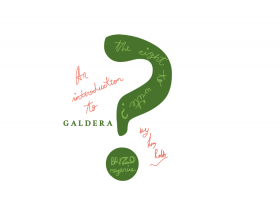People tend to ask me whether I think in English or in Spanish quite frequently, and having spoken (and heard) both since I was a toddler as well as having had a comprehensive, lengthy education spanning the two decades of my life in both- all I can really answer is “it’s complicated.” I do not think I can confidently say that one or the other is my first language (what does that even mean?). Every aspect of my life has been in both languages, and I can hardly think of a time when this is not and has not been the case. Sure, I live in an English speaking country at the moment, but I speak Spanish to a large amount of my friends here. Of course, most of my life I lived in a Spanish speaking country, but my house is a Spanglish central if I have ever came across one.
My brain pieces sentences together with whatever word works best for any situation, and when I cannot think of a word with a strong enough emotional association or connotation I switch from one language to the next instantaneously. I do not and never have exclusively worked in Spanish or English, and while I know that this is the case for multiple people around the world, being in the United Kingdom (which feels like such a monolingual environment) I feel a bit stuck attempting to express myself a lot of the time.
In Czech there is a proverb that states that to learn a new language is to obtain a second soul, but to those of us who have spoken two since we can remember things are a bit different. It really isn’t like I exist as two different people when I speak English or Spanish because I grew up with both in my head and my life since forever. Having a hybrid identity and language capacity as far back as I can fathom is a fundamental part of my nature, and it can hardly be considered special, but it still feels rather strange when you move into a culture where the default is to know one language (English) and that the rest of the world will follow in your stride because that is the way that things have always been.
I carry my Spanglish with me everywhere, and while it is not a language recognized formally, to me it is just as real as anyone else’s English or Spanish, and I speak multiple variations of my Spanglish no matter where I am. Amy Tan’s essay “Mother Tongue” resonated with me particularly as she discussed how strange it feels to speak the formal variety of English when she, at home speaks an entirely different vernacular with her mother. A standalone language by itself with no complementary crutches in any other form feels strange to speak when the world you know has always been a collection of words oddly sewn to one another to form the most familiar and comfortable of quilts to keep you warm and accompanied wherever you go. You speak different variations of English and Spanish with syntax and grammar that could hardly be recognized as proper by the Real Academia Española or by the Oxford English Dictionary, but just as colloquial variations of either language, they feel just as legitimate at the end of the day. They are the languages that we understand better, our mother tongues.
The reason I refuse to call my bilingual way of being a superpower is because it is hardly uncommon to find people around the world who share this experience with me. While calling my situation universal is hardly appropriate, language, for so many of us is something that mixes, matches, and evolves alongside others in a way that mainstream academia can hardly do by itself. Language for so many of us is hardly a barrier but rather an imperfect mixture of two or more forms of communicating to find the one that suits us best. Still, however, there are monolingual people who stare at me in confusion when I look for the right word to use in a specific situation when the first one that popped into my head was in a language that they could not understand.
For these reasons, I have never related more to a book’s usage of language than Trinidadian author Sam Selvon’s The Lonely Londoners creolized introduction into the world of immigrants of largely Caribbean origin attempting to communicate and fit into the world around them. Their language use sets them apart from the London in which they live and symbolically illustrates their isolation and disadvantage of living in a society carved up to exclude this diversity. The English used throughout the novel hardly budges, and to many of us who read it is admittedly a bit difficult to fully comprehend initially, but eventually allows a more full and accurate picture to be painted about the different characters and their experiences as individuals. The characters’ humanity and struggle allow a greater, less aloof picture to be painted about their lives than if the novel was written in “king’s English” that we as readers are so accustomed to finding in canonical literature.
It seems un poco hipócrita that most of this article is written in the formal English I have learned to speak at school, pero ultimately it is the way that I have been taught to in a literary/journalistic context como this one. It also feels weird que no estoy putting the words in Spanish in italics cuando las uso, pero maybe it is about time we all took time to understand and comprehend the reasons why. Maybe one day mi Spanglish, and any other variation or hybrid of a language will be considered just as real by the old white men who run the institutions that dictate cultural standards telling lots of us to go back to our place of origin… as if that place even exists.
art by Mafer Martinez




